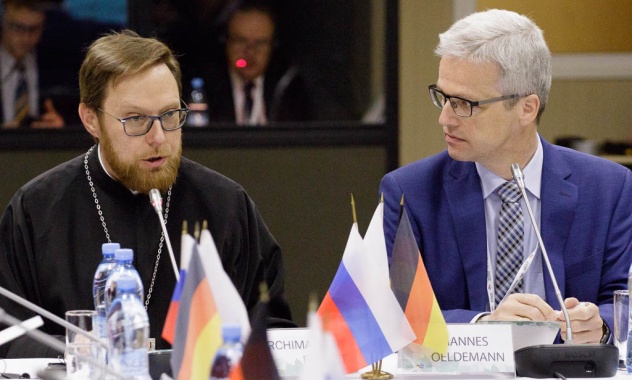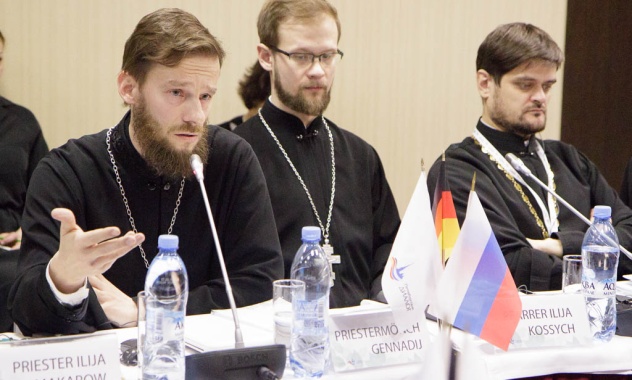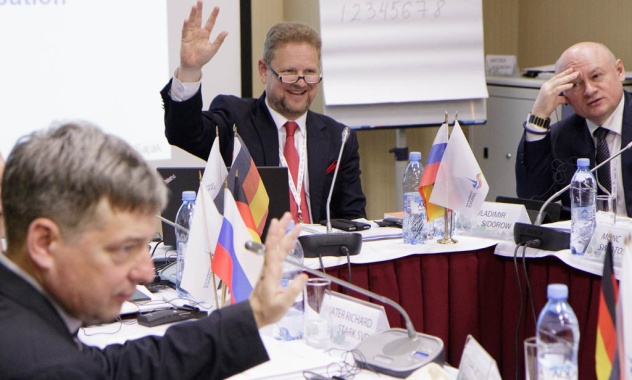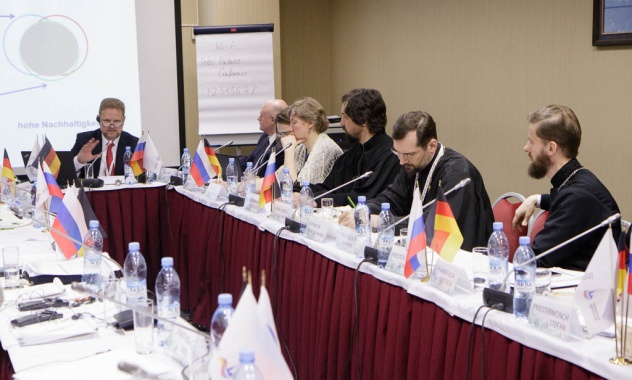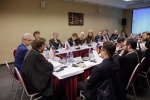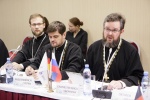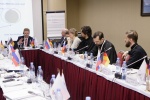Churches in Europe working group of Russian-German forum of civil societies ‘St. Petersburg Dialogue’ meets for its regular session
On 4-5 April, 2017, the Churches in Europe working group of the Russian-German forum ‘St. Petersburg Dialogue’ met for its regular session in St. Petersburg. The meeting was devoted to the theme ‘Religious and Ethical Formation and Education in Today’s Russian and German Societies’.
The meeting was attended by representatives of the Russian Orthodox Church including Archimandrite Philaret (Bulekov), vice-chairman of the Moscow Patriarchate department for external church relations (DECR) and co-chairman of the Churches in Europe working group; Archpriest Sergiy Zvonarev, DECR secretary for the far abroad; Hieromonk Stephen (Igumnov), DECR secretary for inter-Christian relations; the Rev. Iliya Makarov, first deputy chairman of the St. Petersburg diocesan department for religious education and catechism; the Rev. Iliya Kosykh, head of the DECR communication service; Hieromonk Gennady (Voitishko), head of the information service of the ROC synodal department for religious education and catechism (SDREC); Archpriest Dimitry Sizonenko, St. Theodore Cathedral in St. Petersburg; Deacon German Demidov, head of the SDREC section for basic Orthodox culture; Ms. Ye, Balashova, SDREC specialist in expertise and accreditation; and Father Yaroslav (Ochkanov), DECR secretariat for the far abroad. There were also Dietrich Brauer, Archbishop of the Evangelical Lutheran Church in Russia, and S. Sydorov, director of the Ss Cyril and Methodius High School ‘Hellas’ in Moscow.
From the German side where were Dr. Johannes Oeldemann, director of the Institute of Ecumenics; Joachim Liebig, primate of the Evangelical Church of Anhalt; Joachim Libieg, member of the St. Petersburg Dialogue forum; Prof. Dr. Bernhard Grümme, University of Rurh faculty of Catholic theology; Dr. Martin Illert, representative of the Supreme Council of the Evangelical Lutheran Church in Germany, Dr. Dorothee Kaes, secretary of the German Conference of Catholic Bishops; Prof. Dr. Lothar Kuld, Weingarten Pedagogical Higher School; Prof. Dr. Ulrike Link-Wieczorek, University of Oldenburg Institute of Evangelical Theology and Religious Education; Prof. Dr. Frank Michael Lutze, University of Leipzig faculty of theology; Prof. Dr. Claus Peter Sajak, Westphalian University of Munster faculty of Catholic theology; the Rev. Michael Schwarzkopf, rector of the Evangelical Lutheran churches of Ss Peter and Paul and St. Catherine in St. Petersburg; the Rev. Richard Stark, rector of the Catholic Parish of the Visitation of the Blessed Virgin Mary by Elizabeth; and Mr. Dirk Stelter, representative of the Supreme Council of the Evangelical Lutheran Church in Germany.
The meeting was co-moderated by Archimandrite Philaret and Dr. Oeldemann.
In the beginning of the meeting all those present honoured the memory of the vicitms of the terror act in the St. Petersburg metro. The German participants, on their part, expressed condolences over the death of innocent people and solidarity with the bereaved families and the injured. The participants stressed that extremism is a falsification of religion and has nothing to do with it.
Reports were heard by Deacon German Demidov, who dealt with ‘Religious education and religious and ethical education in today’s Russian society’. Archpriest Dimitry Sizonenko spoke on ‘Religious formation and education in the light of inter-Christian cooperation’, the Rev. Iliya Makarov and Ms, V. Gusakova, St. Petersburg Academy of Post-Grade Pedagogic Education, highlighted the theme ‘Religious education and formation in the cultural space in St. Petersburg’. Prof. Dr. Sajak spoke on ‘What is influenced by religious education. Results of the empiric studies of the significance of religious socialization’. Prof. Link-Wieczorek spoke on ‘The meaning of religious education. Protestant contribution in inter-Christians perspective’. Prof. Lutze read a paper on ‘Religious education – non-religious students: A reflection in non-confessional context of East Germany’.
The discussion focused on the approaches made by churches in Russia and Germany to religious education and formation. Both sides noted a great extent of the secularization of the two countries, which, as was repeatedly pointed out in the discussion, needs a search for new approaches to missionary and catechetical work. The speakers shared their experience of work with the youth and adults. It was agreed that, due to the progressive secularization, the Churches should intensify their work in this area.
During their stay in St. Petersburg, participants visited the New Maiden Convent and the St. Vladimir Orthodox School run by the convent, in which they could talk to students and ask questions concerning the academic process in the Orthodox high school.
DECR Communication Service







